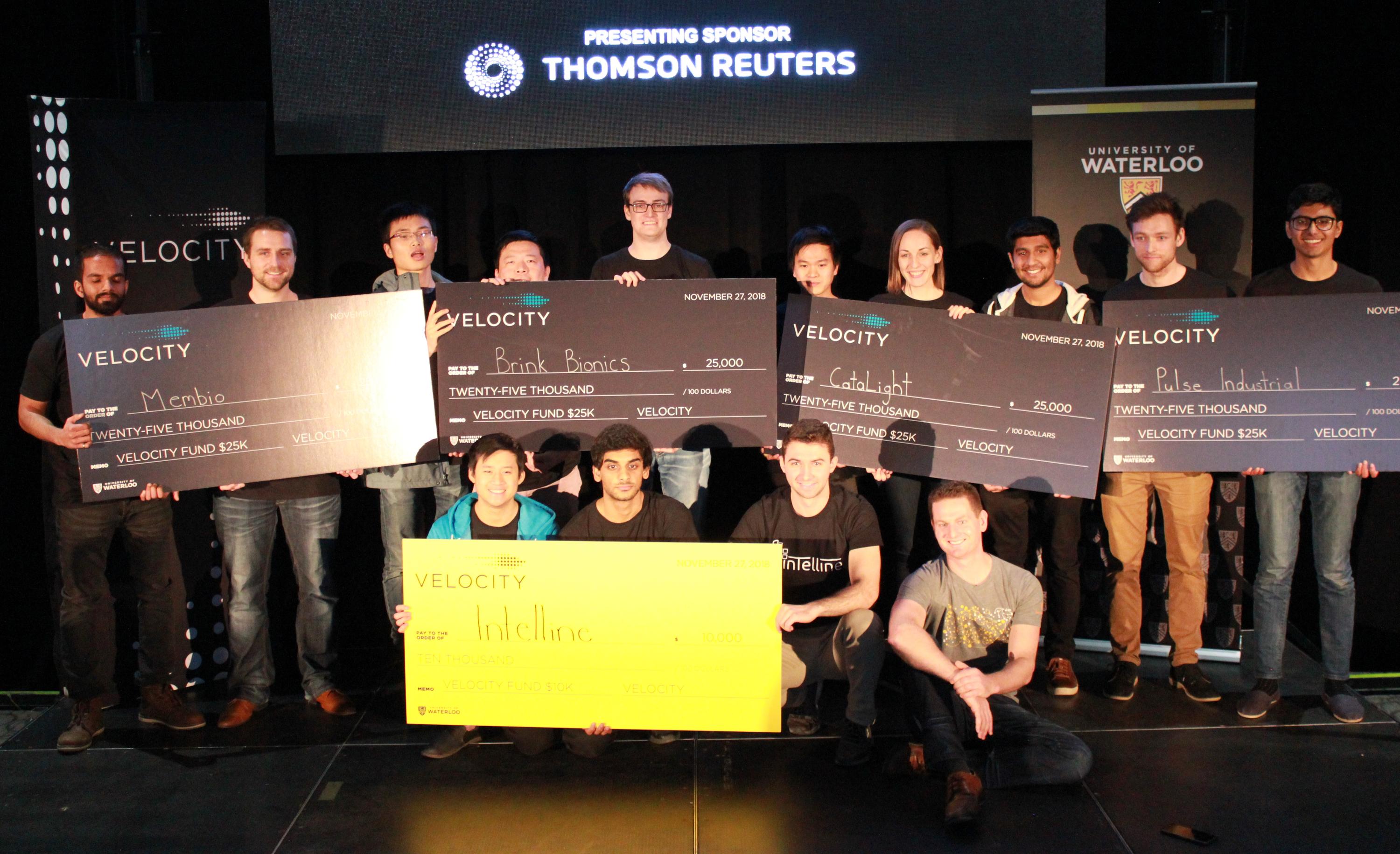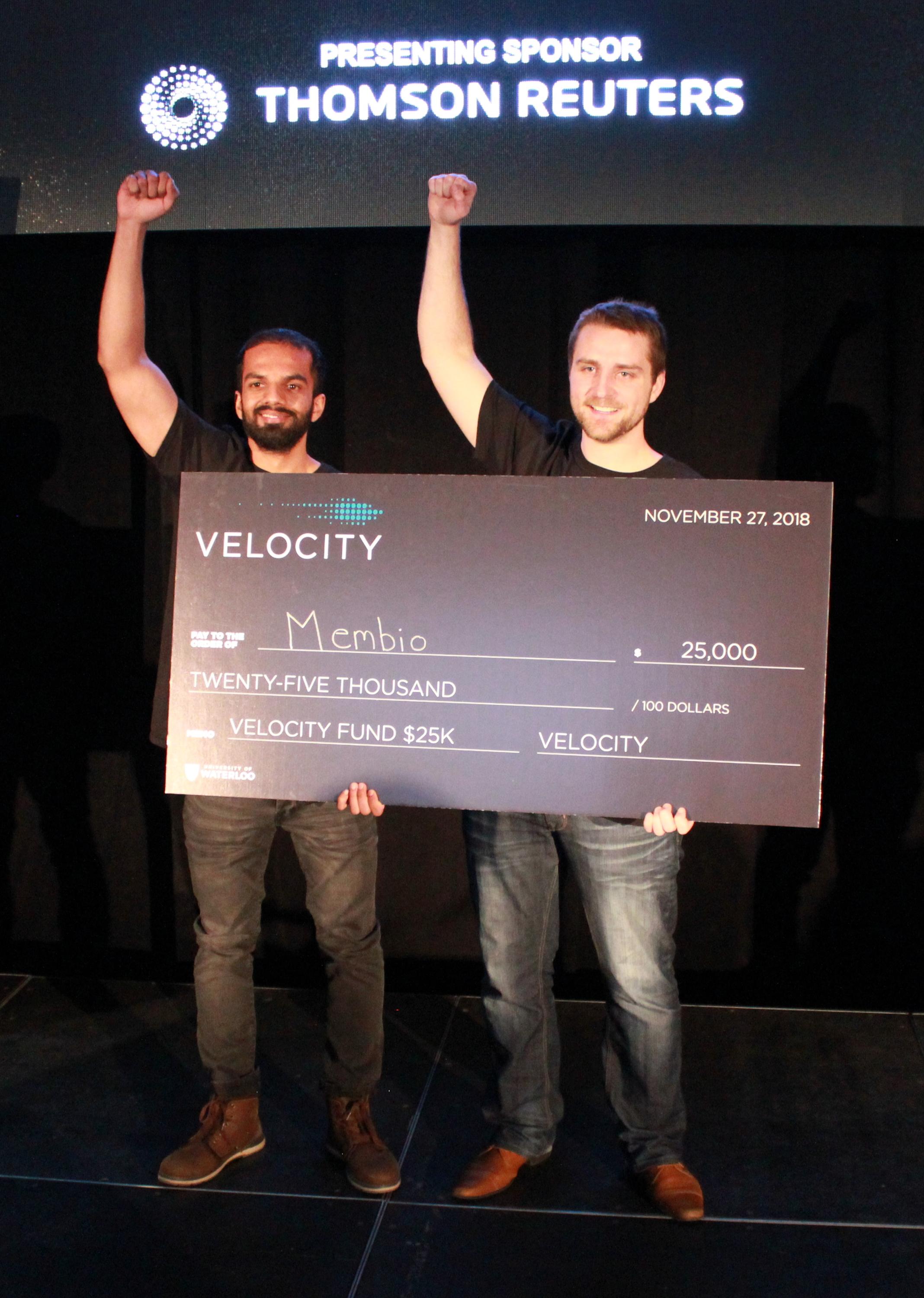It was a clean sweep today as startups with ties to Waterloo Engineering went home with the entire $130,000 up for grabs at the Velocity Fund Finals.
Engineering students, alumni and faculty were on teams that took all nine awards at the popular pitch event, which is staged three times a year by the Velocity entrepreneurship program at the University of Waterloo.

Winners in the $25,000 and hardware categories at the Fall 2018 edition of the Velocity Fund Finals pose with their cheques.
Twenty startups competed at the Student Life Centre for four $25,000 prizes, four $5,000 prizes and a $10,000 award for the top hardware company.
The teams each had three minutes to pitch their startups to a panel of judges.
Waterloo Engineering winners in the $25,000 category, who also earned space in the Velocity garage startup incubator in downtown Kitchener, were:
Brink Bionics (Erik Lloyd, master of systems design engineering, 2019; Ning Jiang, professor of systems design engineering; Jiayuan He, post-doctoral engineering researcher), which is developing bionic arms that use machine learning and integrate with the human body to provide amputees with a more intuitive experience.
Catalight (Ashley Keefner, master of business, entrepreneurship and technology, 2018; Vishal Vinod, master of business, entrepreneurship and technology, 2018; Kevin Dang, chemical engineering, 2017), which is making safe drinking water accessible for all by developing a new kind of water treatment solution.

Moin Ahmed (left) and Shane Kilpatrick of Membio celebrate their $25,000 win at the Velocity Fund Finals.
Membio (Shane Kilpatrick, master of business, entrepreneurship and technology, 2018; Moin Ahmed, master of chemical engineering, 2018), which is developing the first truly scalable biological manufacturing platform.
Pulse Industrial (Munish Raghuwanshi, chemical engineering, 2016), which is developing a smart monitoring system for steam traps to improve safety and reduce CO2 emissions. The other two members are Thomas Uhlenbruck and Shahriar Kabir.
The $10,000 hardware prize went to:
Intelline (Kyle Faller, Jason Young and Omar Shakir, all 3B mechanical engineering), which designs and manufactures affordable and scalable cryocoolers, enabling the widespread commercial use of superconductor-based technologies. The fourth team members is Chris Mathew.
In the $5,000 category for early stage startups, the Waterloo Engineering winners were:
FEM in STEM (Mylene Tu, 1A management engineering), which empowers young women to develop careers in under-represented industries through programming and resources.
Material Futures Lab (Iris Redinger, 2B architecture), which uses bacteria to create natural, eco-friendly pigments for textile dyeing. The other team member is Mark Whyte.
Oleotech (Cassidy Molloy, Gene Shim, Sinclair Hidajat, Timothy Yeung and Zeinab Sidahmed, all 4A chemical engineering), which is using oleophilic properties of fibre from waste tires to remove hydrocarbons in stormwater runoff.
PriveHealth (Lichen Zang, master of civil engineering, 2019), which is a gamified cybersecurity training platform for healthcare professionals.
The Velocity Fund was established in 2011, inspired by a $1-million donation from Kik Interactive founder Ted Livingston. Angel investor Mike Stork donated another $1 million to the fund in 2014.